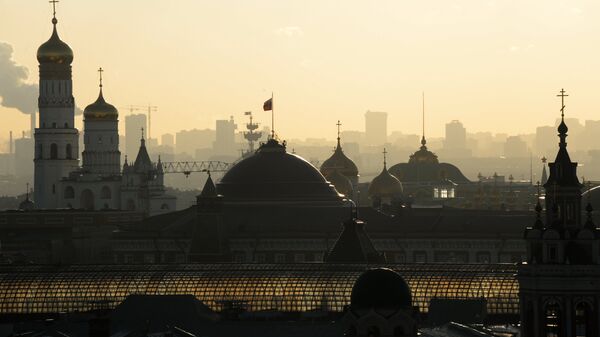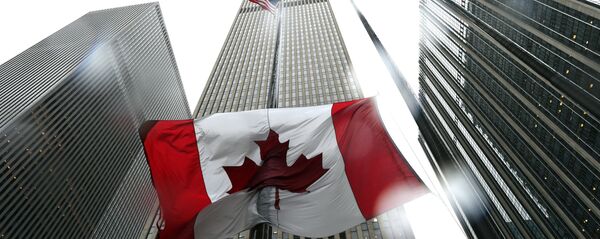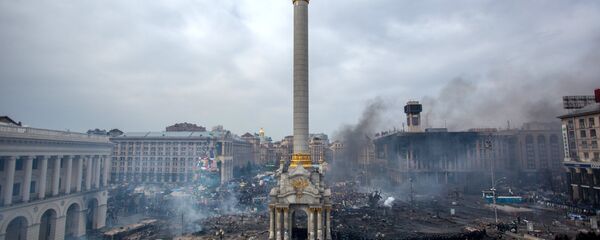In an analytical piece for Russian news and analysis journal PolitRussia, Radugin points out that US Secretary of State John Kerry has made some revealing commentary on the TTP this week which Moscow cannot afford to ignore.
"Make no mistake: This is not your parents' or your grandparents' trade agreement," Kerry said, speaking at an event hosted by the Pacific Council on International Policy in Los Angeles on Tuesday. "TTP is the highest-standard trade deal ever reached – period," he added.
"He's telling the truth here," Radugin noted. "This is not an ordinary agreement. The TTP is a project which is meant to change the architecture of the global economy."
"When we develop a deep connection to the TTP, we can rewrite the rules of international trade on the basis of its values," the secretary of state emphasized.
Kerry's second important statement, Radugin writes, relates to the interconnection between foreign and economic policy: "As Secretary of State, I have worked from day one to emphasize that foreign policy is economic policy and economic policy is foreign policy," Kerry said.
This sentiment, Radugin suggests, serves as the key to understanding the dramatic events which have taken place in Ukraine over the last two years.
"Take note: Kerry is talking about a partnership where new rules will be set for the global economy. These rules, without a doubt, will serve, first and foremost, to ensure US prosperity. It's worth noting that in practice, one of the most serious US pretensions is to extend its jurisdiction across the entire planet. The implementation of such a plan obviously sets to put an end to the sovereignty of all those countries that will accept these rules."
"Moscow," for its part, "has refused. This means that Russia will not enter into the new association, under whose [economic] rules much of the world will soon begin to live. This is a situation where 'one man in the field is no warrior'; at the same time, no country has the desire to be relegated to the status of a backwater. Hence our country's promotion of the idea of the Eurasian Economic Union (EEU). This alliance undeniably evens out the odds between the countries belonging to the TTP, and those that remain outside of it."
Hence, Radugin notes, "our chance to preserve our sovereignty and to remain ourselves lies in the creation of an economic union which has sufficient industrial and consumer ability to develop. The EEC, in this case, is our opportunity."
"The example of Ukraine is very revealing. It's clear that Kiev, which had been beckoned by the sweet carrot, and promised mountains of gold, is now a country that [Western powers] have lost interest in. In its present condition as a bankrupt state, it simply isn't needed by anybody. The EU will be closed to Kiev, no one will invite it into the [TTIP] and for the EEU too it is too big a burden."
Washington's geopolitical strategizing, Radugin argues, has turned Ukraine into a "game piece – a pawn, whose purpose is to serve as a tool to aggravate and put pressure on Russia."
At the same time, Russia's efforts to get Kiev to join the EEU project have also passed, "with a policy of brotherly relations replaced by pragmatism."
Therefore, the journalist notes, "it can be said with confidence that Russia's plans in relation to its neighbors have changed. Even if the country turned away from its pro-Western course tomorrow, membership in the EEU would not be on the table," at least in the short turn. "Putin would never weigh down the fledgling Russian economy with such a burden. This means that the country will have to recover, over a long period of time, and on its own."
For its part, "the EEU is developing slowly, but surely and steadily. Many countries which are not prepared to lose their sovereignty and their own cultural identity are carefully eyeing the EEU, Iran for example."
Crucially, the analyst adds, "according to economists' estimates, Iran, were it to join the EEU, could replace Ukraine" in terms of its economic potential. "This Middle Eastern country's entrance into the union would help make it sustainable, comprehensive and competitive, hence the many recent 'surprises' appearing on the world map" in the region.
Ultimately, Radugin notes, "Russia did not succeed in getting closer to the European Union, or in including Ukraine [into the EEU project]. This loss was not Moscow's fault, so much as the lack of a strong start, along with the infantilism and political blindness of its partners," Kiev first and foremost among them.
"However, we are only at the half-time. The second half will play out according to a largely defined foreign policy doctrine on Moscow's part, and our chances for success are pretty good." The first important victories, the journalist suggests, will come "when the countries that signed on to the TTP realize that they have become hostages to America's rules."
"Eliminating [national] traditions is a painful and bloody thing, and Washington does not know how to communicate with others on an equal footing. Their credo is the creation of a world according to their template. Kerry does not hide this fact when he says that 'we [the US] remain the primary country that others turn to for leadership'."
"And so, the next stage of the game is beginning. In it, Moscow has one big advantage, since it understands that life is not a game of chess – but a game of poker."






